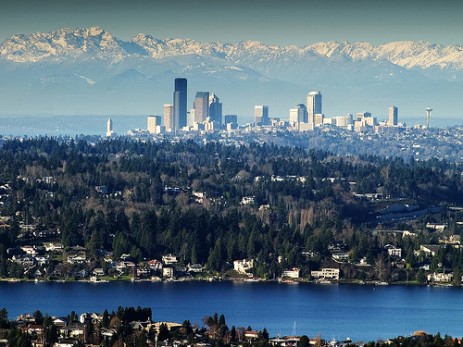Seattle Times environmental reporter Craig Welch profiles one of the more puzzling characters in recent urban politics, Seattle’s now-former mayor, Greg Nickels. The piece treads some of the same ground as my profile of Nickels last month: after demonstrating national leadership in rallying mayors on climate change, Nickels received no political credit back home. Seattle, a supposedly green-minded city, tossed him out in a primary race last August and elected regional Sierra Club leader Mike McGinn instead.
Welch points out that Nickels’ home record on sustainability included some real accomplishments:
He fought sprawl by building up, added more bike lanes and tried reducing the ease of parking to discourage driving. He essentially doubled recycling rates and started a national conversation about waste, leading the charge to reduce landfill-clogging plastic by pushing (unsuccessfully) for the city to charge for disposable grocery bags. The city partnered with Nissan, which is making Seattle a test market for a new electric vehicle, installing more than 2,500 charging stations around town.
And last summer, Nickels’ light-rail dream started rolling, just as the Natural Resources Defense Council named Seattle the nation’s most sustainable city.
On the biggest urban threat to the health of Puget Sound—stormwater runoff—the city became a leader, increasingly turning to green roofs and cisterns and bio-swales to filter pollutants from rain water to slow their release into storm drains.
In my piece, I wondered whether Nickels didn’t get more credit because Seattleites are ready for more and bolder leaps toward carbon-free living.
Welch explores whether it was Nickels’ style, not the substance of his actions, that was too abrasive for this famously polite city. Residents saw an increase in large, tall infill developments, they were asked to approve a fee on disposable bags, yet—the argument goes–Nickels failed to explain how all this was adding up to something bigger.
“While [Nickels’ climate-change program] was celebrated across the country and while Al Gore came to Seattle to sing its praises, it was not adequately laid out to local people as something that was to their advantage,” SeattlePI.com political columnist Joel Connelly told me last November. “Hence, you had a ‘nanny state’ reaction to it.”
I think there’s a danger in journalists demanding better “narratives” from politicians, as if the main problem is that our leaders aren’t eloquent enough. Still, Connelly is on to something. Nickels’ loss speaks to the need for green leaders to sketch out what they want us to move toward. The sustainability movement has got to be about more than absence (of dangerous greenhouse gases, of toxic pollutants in the air and water). There needs to be a positive vision of the future for voters—more pleasant places to live, easier commutes, stronger communities.




